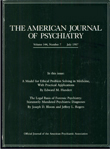Dr. Hoge Replies
TO THE EDITOR: Dr. Hassenfeld raises several important points in his letter. His observation that our study did not address the long-term consequences of antipsychotic medication refusal and involuntary treatment is, of course, correct. It has been suggested that involuntary treatment may have considerable psychological effects and that some patients may become alienated from treatment as a result. This claim has not been empirically substantiated. In the only study to date, Cournos and colleagues (1) compared state hospital patients who were involuntarily medicated under New York State's judicial review system with patients who were compliant with treatment; they failed to find any differences in rates of discharge, subsequent outpatient compliance, or rehospitalization. While that study is an important contribution to the literature on refusal of treatment, I agree with Dr. Hassenfeld that many questions about the long-term course of refusers remain unanswered. We need to know more about the course of patients who refuse treatment and are not taken to review. A prospective study conducted in Massachusetts, a jurisdiction with a judicial review system, found that only 18% of refusing patients reached review (2). Of particular concern are patients who are discharged from the hospital untreated; approximately one-fourth of the group in the Massachusetts study fell into this category.
Given his recognition that there is a paucity of such data, it is particularly puzzling that Dr. Hassenfeld criticizes the Virginia scheme under which psychiatrists have the discretion to override patients' refusals. He believes that it “completely disregards the potential psychological benefit for patients in retaining some sense of personal autonomy.” Implicit in his criticism is the assumption that patients would fare better under some other system of review. There is no evidence that this is so, although the hypothesis is testable. Having practiced and researched treatment refusal in Massachusetts and Virginia, I can offer my own impressions on this point. The most important variable in the administration of involuntary treatment is the therapeutic relationship. Psychiatrists who maintain a therapeutic relationship with noncompliant patients have the best chance to maximize autonomy-enhancing treatment effects and to minimize negative psychological impact. Patients must continue to be treated respectfully and to be involved in treatment decision making to the greatest extent possible. In my experience, clinicians in the two jurisdictions are equally successful in practicing this difficult art. In the minority of cases, a subset of clinicians will interpret treatment refusal as a signal that the therapeutic relationship is over and that their sole course of action is to file a petition or to write an involuntary treatment order. These patients are not receiving our best, and it is my hypothesis that as a result, they do not achieve the best outcomes.
1. Cournos F, McKinnon K, Stanley B: Outcome of involuntary medication in a state hospital system. Am J Psychiatry 1991; 148:489–494Link, Google Scholar
2. Hoge SK, Appelbaum PS, Lawlor T, Beck JC, Litman R, Greer A, Gutheil TG, Kaplan E: A prospective, multicenter study of patients' refusal of antipsychotic medication. Arch Gen Psychiatry 1990; 47:949–956Crossref, Medline, Google Scholar



